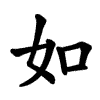Definify.com
Definition 2026
得
得
Translingual
| Stroke order | |||
|---|---|---|---|

| |||
Han character
得 (radical 60 彳+8, 11 strokes, cangjie input 竹人日一戈 (HOAMI), four-corner 26241, composition ⿰彳㝵)
References
- KangXi: page 367, character 31
- Dai Kanwa Jiten: character 10137
- Dae Jaweon: page 691, character 16
- Hanyu Da Zidian: volume 2, page 828, character 3
- Unihan data for U+5F97
Chinese
|
simp. and trad. |
得 | |
|---|---|---|
| alt. forms |
㝵 㕌 |
|
Glyph origin
| Characters in the same phonetic series (得) (Zhengzhang, 2003) | |
|---|---|
| Old Chinese | |
| 得 | *tɯːɡ |
| 淂 | *tɯːɡ |
| 棏 | *dɯːɡ, *rtɯːɡ |
Phono-semantic compound (形聲, OC *tɯːɡ) : semantic 彳 + phonetic 㝵.
㝵 is the ancient form of 得, composed of 貝 (“cowry”) + 又 (“hand”), i.e. “to obtain valuables”.
Pronunciation 1
- Mandarin
- Cantonese (Jyutping): dak1
- Hakka (Sixian, PFS): tet
- Min Dong (BUC): dáik
- Min Nan (POJ): tek / chek
- Wu (Wiktionary): teq (T4)
- Mandarin
- (Standard Chinese, Beijing)+
- Pinyin:
- Zhuyin: ㄉㄜˊ
- Wade-Giles: tê2
- Gwoyeu Romatzyh: der
- IPA (key): /tɤ³⁵/
-

- (Standard Chinese, Beijing)+
- Cantonese
- (Standard Cantonese, Guangzhou)+
- Jyutping: dak1
- Yale: dāk
- Cantonese Pinyin: dak7
- IPA (key): /tɐk̚⁵/
- (Standard Cantonese, Guangzhou)+
- Hakka
- (Sixian, incl. Miaoli and Meinong)
- Pha̍k-fa-sṳ: tet
- Hakka Romanization System: ded`
- Hagfa Pinyim: ded5
- IPA: /tet̚²/
- (Sixian, incl. Miaoli and Meinong)
- Min Dong
- (Fuzhou)
- Bàng-uâ-cê: dáik
- IPA (key): /taiʔ²⁴/
- (Fuzhou)
- Min Nan
- Wu
- (Shanghainese)
- Wiktionary: teq (T4)
- IPA (key): /təʔ⁵⁵/
- (Shanghainese)
- Dialectal data▼
| Variety | Location | 得 |
|---|---|---|
| Mandarin | Beijing |
/tɤ³⁵/ /tei²¹⁴/ |
| Harbin |
/tɤ²⁴/ ~意 /tɤ²¹³/ ~病 |
|
| Tianjin |
/tɤ⁴⁵/ /tei¹³/ ~虧 |
|
| Jinan |
/tə²¹³/ /tei²¹³/ |
|
| Qingdao | /te⁵⁵/ | |
| Zhengzhou | /tɛ²⁴/ | |
| Xi'an | /tei²¹/ | |
| Xining | /ti⁴⁴/ | |
| Yinchuan |
/ta¹³/ /tia¹³/ /tə¹³/ |
|
| Lanzhou | /tə¹³/ | |
| Ürümqi |
/tɤ⁵¹/ /tei⁵¹/ |
|
| Wuhan | /tɤ²¹³/ | |
| Chengdu | /te³¹/ | |
| Guiyang | /tɛ²¹/ | |
| Kunming | /tə³¹/ | |
| Nanjing | /təʔ⁵/ | |
| Hefei | /tɐʔ⁵/ | |
| Jin | Taiyuan |
/tiəʔ²/ ~罪 /təʔ²/ ~到 |
| Pingyao |
/tiʌʔ¹³/ 吃~ /tʌʔ¹³/ ~手 |
|
| Hohhot | /tiəʔ⁴³/ | |
| Wu | Shanghai | /təʔ⁵/ |
| Suzhou | /təʔ⁵/ | |
| Hangzhou | /təʔ⁵/ | |
| Wenzhou | /te²¹³/ | |
| Hui | Shexian | /teʔ²¹/ |
| Tunxi | /ti⁵/ | |
| Xiang | Changsha | /tə²⁴/ |
| Xiangtan | /tæ²⁴/ | |
| Gan | Nanchang | /tɛʔ⁵/ |
| Hakka | Meixian | /tet̚¹/ |
| Taoyuan | /tet̚²²/ | |
| Cantonese | Guangzhou | /tɐk̚⁵/ |
| Nanning | /tɐk̚⁵⁵/ | |
| Hong Kong | /tɐk̚⁵/ | |
| Min | Xiamen (Min Nan) |
/tik̚³²/ /tit̚³²/ |
| Fuzhou (Min Dong) | /taiʔ²³/ | |
| Jian'ou (Min Bei) | /tɛ²⁴/ | |
| Shantou (Min Nan) | /tik̚²/ | |
| Haikou (Min Nan) | /ʔdit̚⁵/ |
| Rime | |
|---|---|
| Character | 得 |
| Reading # | 1/1 |
| Initial (聲) | 端 (5) |
| Final (韻) | 德 (131) |
| Tone (調) | Checked (Ø) |
| Openness (開合) | Open |
| Division (等) | I |
| Fanqie | 多則切 |
| Reconstructions | |
| Zhengzhang Shangfang |
/tək̚/ |
| Pan Wuyun |
/tək̚/ |
| Shao Rongfen |
/tək̚/ |
| Edwin Pulleyblank |
/tək̚/ |
| Li Rong |
/tək̚/ |
| Wang Li |
/tək̚/ |
| Bernard Karlgren |
/tək̚/ |
| Expected Mandarin Reflex |
de |
| Baxter-Sagart system 1.1 (2014) | |
|---|---|
| Character | 得 |
| Reading # | 1/1 |
| Modern Beijing (Pinyin) |
dé |
| Middle Chinese |
‹ tok › |
| Old Chinese |
/*tˤək/ |
| English | obtain |
Notes for Old Chinese notations in the Baxter-Sagart system: * Parentheses "()" indicate uncertain presence; | |
| Zhengzhang system (2003) | |
|---|---|
| Character | 得 |
| Reading # | 1/1 |
| No. | 2165 |
| Phonetic component |
得 |
| Rime group |
職 |
| Rime subdivision |
0 |
| Corresponding MC rime |
德 |
| Old Chinese |
/*tɯːɡ/ |
Definitions
得
- to get; to obtain; to gain, to acquire
- to contract (disease); to become ill with
- to result in; to produce
- to be ready; finished
- to suit; to fit
- fit; proper
- satisfied; contented
- used before verbs to express possibility and permissibility, usually used in the negative
- interjective particle expressing approval or prohibition; see 得了
- interjective particle expressing frustration or helplessness
Compounds
Derived terms from 得
|
|
|
Pronunciation 2
- Mandarin
- (Standard Chinese, Beijing)+
- Pinyin:
- Zhuyin: ㄉㄜ˙
- Wade-Giles: tê5
- Gwoyeu Romatzyh: .de
- IPA (key): /d̥ə/
-

- (Standard Chinese, Beijing)+
- Pinyin:
- Zhuyin: ㄉㄧ˙
- Wade-Giles: tih5
- Gwoyeu Romatzyh: .di
- IPA (key): /d̥i/
- Note: di is used in poetry, songs.
- (Standard Chinese, Beijing)+
- Cantonese
- (Standard Cantonese, Guangzhou)+
- Jyutping: dak1
- Yale: dāk
- Cantonese Pinyin: dak7
- IPA (key): /tɐk̚⁵/
- (Standard Cantonese, Guangzhou)+
Definitions
得
- Used after a verb or an adjective and before a complement.
- 好得很 ― hǎo de hěn ― very good
- 他痛得直哭。 ― Tā tòng de zhí kū. ― He feels great pain, crying.
- 他跑得快。 ― Tā pǎo de kuài. ― He runs fast.
- 他跑得像一阵风。 ― Tā pǎo de xiàng yī zhèn fēng. ― He runs like wind.
- 看得見 / 看得见 ― kàn de jiàn ― able to see
- 他畫得好。 / 他画得好。 ― Tā huà de hǎo. ― He paints well.
- 賣得幾多錢? [Cantonese, trad.]
- 卖得几多钱? [Cantonese, simp.]
- From: 《氹氹轉,菊花園》
- Maai6dak1 gei2 do1 cin2? [Jyutping]
- How much can it sell for?
- Used after a verb to express possibility or capability.
Usage notes
- When it is used between a verb and the complement, and the complement is used to indicate possibility or capacity, the negative form replaces 得 with 不 (bù).
- If it is used after a verb-object construction, the verb is repeated again as "verb-object-verb-得-complement".
Compounds
Derived terms from 得
|
|
|
Pronunciation 3
- Mandarin
- (Standard Chinese, Beijing)+
- Pinyin:
- Zhuyin: ㄉㄟˇ
- Wade-Giles: tei3
- Gwoyeu Romatzyh: deei
- IPA (key): /teɪ̯²¹⁴/
-

- (Standard Chinese, Beijing)+
- Cantonese
- (Standard Cantonese, Guangzhou)+
- Jyutping: dak1
- Yale: dāk
- Cantonese Pinyin: dak7
- IPA (key): /tɐk̚⁵/
- (Standard Cantonese, Guangzhou)+
Definitions
得
Compounds
Korean
Hanja
得 • (deuk) (hangeul 득, revised deuk, McCune-Reischauer tŭk, Yale tuk)